Resources to Help Train Your Dairy Employees with Animal Care Responsibilities
Resources to Help Train Your Dairy Employees with Animal Care Responsibilities
Betsy Hicks, Area Dairy Specialist, SCNY Dairy & Field Crops Team
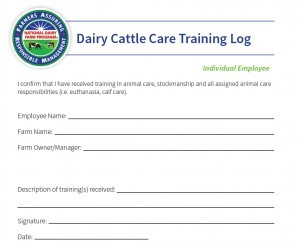
With the Farmers Assuring Responsible Management (FARM) Program having launched version 4.0, dairy owners are now tasked with supplying continuing education (CE) for their employees (both family and non-family) that have animal care responsibilities. Continuing education is required for employees that have responsibilities with animals in stockmanship, pre-weaned calf care, fitness for transport, non-ambulatory animals or euthanasia. If an employee has animal responsibilities for calves but does not handle non-ambulatory animals, they only need continuing education for calves. Likewise, if an employee only moves cows to and from the parlor, they do not need education in calf care. CE should also be in the employees' native language.
In FARM 3.0, only non-farm employees needed to have job-specific training. However, FARM 4.0 requirements for continuing education now includes anyone on the farm who has animal care responsibilities, including owners. This also applies to the cow care/ethics agreement. If non-family employees do not meet these criteria, an audit will trigger a Mandatory Corrective Action Plan to meet requirements within 9 months. For family members who require the above but haven't met the criteria, a Continuous Improvement Plan will be put into place, and must be met within three years.
Luckily, there are several ways to meet the requirements of continuing education. Those mandated for CE can get on-the-job training with the herd veterinarian or nutritionist, or shadow experienced employees and managers. Dairy industry meetings that contain a talk or workshop related to animal care also count as CE. Reading articles and taking a class are two other ways that employees can get CE. Watching webinars and training videos are also an excellent way for groups of employees to gain CE, and discussed during team meetings. Many videos are available in both English and Spanish, so that all employees can have a quality experience.
Also important, documenting the manner of CE is required. The FARM website has resources that farm managers can download and customize for each employee with animal care responsibilities, and maintain in a folder. The Dairy Cattle Care Training Log is one such way that managers can achieve this requirement. Alternatively, there is a Dairy Cattle Care Training Agreement & Activity Attendance Form that farm managers can have employees sign after holding an on-farm training.
The rest of the article is an effort to pull together the various resources that are available online that can be used as a part of a curriculum for employees to learn job-specific information. As always, producers can reach out to their local Extension Educator for pulling together resources and setting up a system for offering and documenting continuing education for their employees.
National FARM
The National FARM Program website is full of resources, worksheets and videos to assist farm managers in creating, giving and documenting animal care continuing education for their employees. Videos such as Natural Behavior in Cattle, Understanding the Flight Zone and Handling Cattle In Alleys, Holding Areas and Milk Parlors are available for producers to use for CE. There are also supplemental quizzes, in both English and Spanish, which can be used to assess knowledge transfer. These can be found at: https://nationaldairyfarm.com/producer-resources/
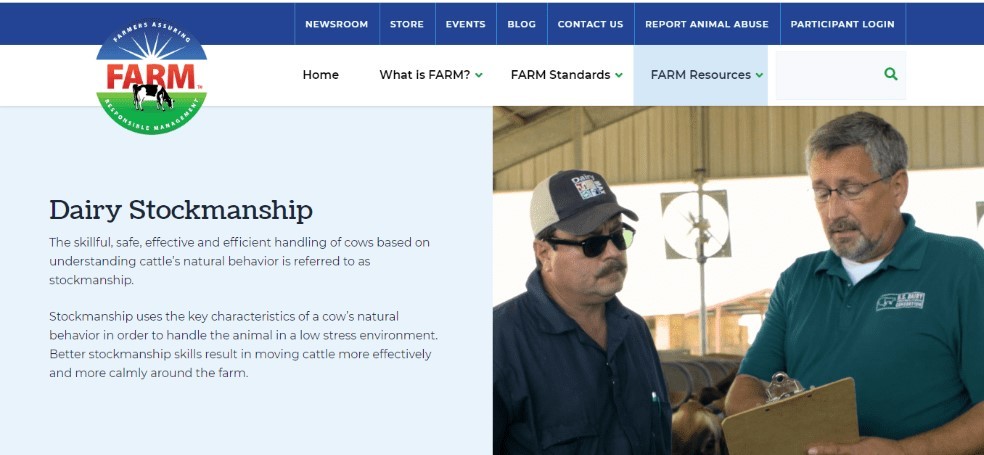
Merck Dairy Care 365
Dairy Care 365 is an online dashboard that contains videos on several topics related to animal care. Newborn Care and Handling, Calf Handling & Stockmanship and Low-Stress Handling of Dairy Calves and Heifers are three modules that employees who work with newborn calves can view. Additional animal care modules offered include Introduction to Dairy Stockmanship and Moving Cows to the Milking Parlor. Milkers and herdspersons can view these videos. Those involved with handling non-ambulatory cows should be trained on this topic, and there is a video for that as well. Dairy Care 365 can be found online at: dairycare365.com
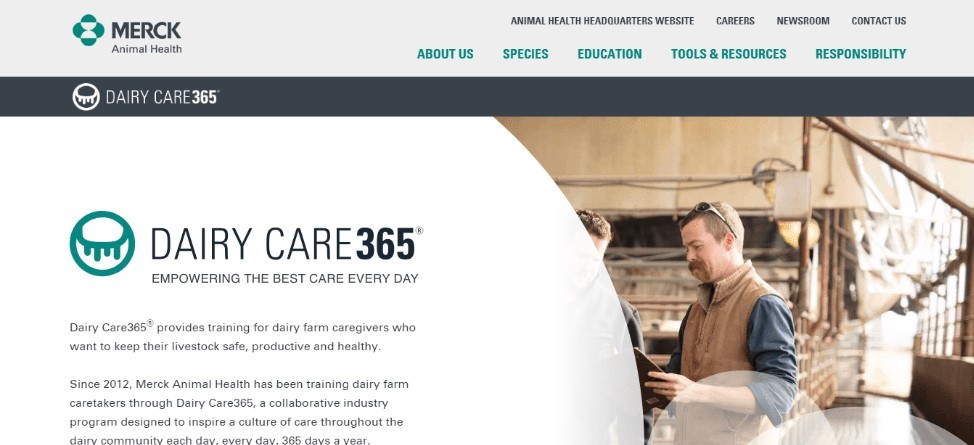
Cornell PRO-DAIRY Program
Cornell's PRO-DAIRY Program periodically holds webinars on various topics related to animal care, herd health and calf care. These webinars can be watched live, or viewed later as recordings are archived in a central location. Archived recordings include Baby It's Cold Outside! Winter Calf Care, Cow Comfort on NY Tiestall and Freestall Dairies and Applied Dairy Immunology and Vaccination Protocol Management. Spanish webinars are also available, and include Milking Routine SOPs and Mastitis Identification, Basic Physiology of how Milk is Produced, and Practical Considerations for Feeding Dairy Calves. The website for all webinars can be located at: https://prodairy.cals.cornell.edu/webinars/
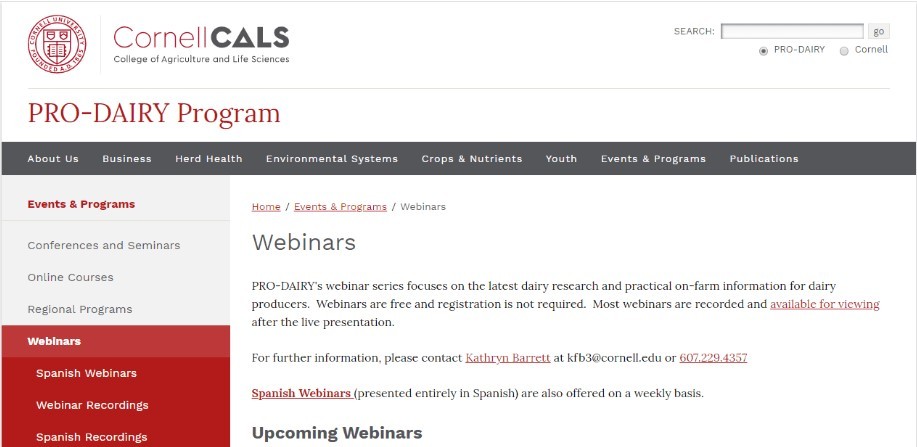
University of Wisconsin-Madison Dairy Extension
The Dairy Extension team at UW also has a set of video resources. These include Dehorning Calves Using Pain Mitigation Techniques, Effective Cattle Handling, and Safe Operation of Skid Steer Loaders among lots of others. They can be found at: https://fyi.extension.wisc.edu/dairy/resources/videos/
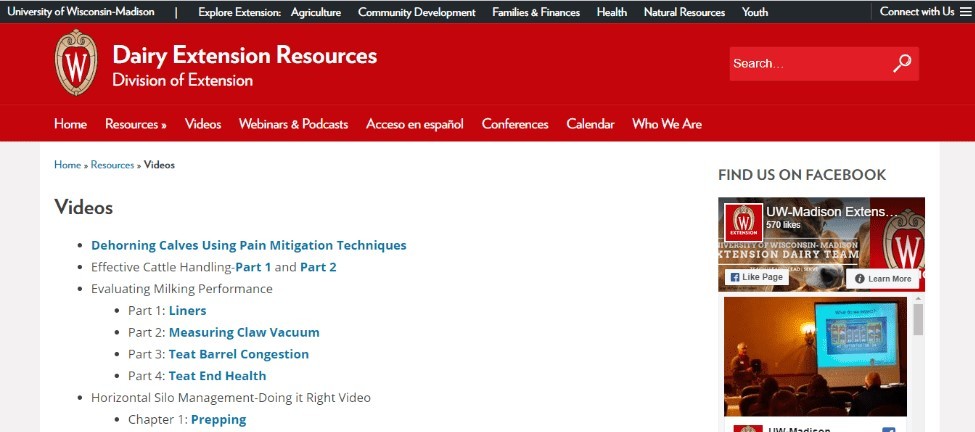
Upcoming Events
NYSDEC How to Get Certified Course
March 3, 2026 : NYSDEC How to Get Certified Course
Ellicottville, NY
NYSDEC training course in preparation to take the pesticide applicator exam.
From Data to Dollars: Making Data-driven Decisions to Increase Farmers Market Success
March 3, 2026
The Cornell Agricultural Marketing Research Program and Penn State University are excited to present this new, 6-week course as part of Cornell's Farmers Market Research Project. The course is for farmers with experience selling at farmers markets who wish to increase their earnings through management and marketing practices.
Cornell Organic Field Crops & Dairy Conference
March 6, 2026
Waterloo, NY
Farmers, researchers, educators, and agricultural service providers from across the Northeast are invited to the 2026 Cornell Organic Field Crops & Dairy Conference, held Friday, March 6, 2026, from 8:00 a.m. to 4:30 p.m. at the Lux Hotel & Conference Center in Waterloo, N.Y.
Co-hosted by New York Soil Health and Cornell CALS, the annual conference brings together leaders in organic grain, dairy, and livestock systems to share practical tools, new research, and farmer-tested strategies to support resilient and profitable organic production.
Announcements
Cows, Crops & Critters Newsletter Sponsorship
TRYING TO REACH GROWERS AND AGRIBUSINESSES IN OUR SOUTHWEST REGION OF NEW YORK?Weekly Email Update: Shared with 625+ households who have signed up with our program.
Monthly Paper Mailer: To reach our stakeholders and farmers who lack internet access, we send out a monthly mailer where your company's logo and contact information would be featured with a mailing list of 330+ households.
If you sponsor our weekly and monthly publications you reach approximately 955 households.





